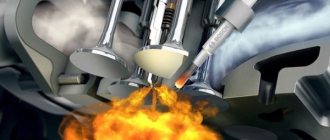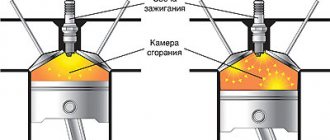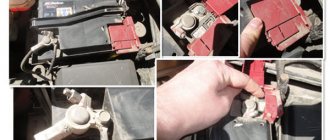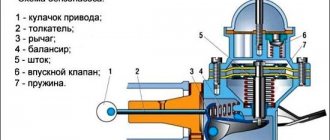It happens that you accidentally poured gasoline into a diesel engine. But sometimes it’s the other way around: I mixed up the filling nozzle and filled in with diesel instead of gasoline! Let's figure out what can happen if you have a gasoline engine, but you fill up with diesel instead of gasoline. Let’s also consider a situation where you have a good diesel engine, but you managed to pour gasoline into your diesel fuel.
Is it possible that gasoline is a problem for a diesel engine? Or maybe this is escalating the situation, and you shouldn’t panic if you splashed gasoline into a diesel car?
Let's find out!
Now, in addition to the gasoline gun, the pumps at gas stations have a hose with diesel fuel - it is black. Often, car owners automatically, without looking, insert a fuel nozzle into the neck of the tank. The driver can mix up the hoses and fill the tank with other fuel, for example, pour gasoline instead of diesel fuel: you can make a mistake abroad, there, most often, the hoses for diesel fuel are the same color as gasoline - somewhere there is a clear inscription Diesel, somewhere - Petroleum
There are two possible mistakes: diesel fuel got into a car with a gasoline engine - diesel was poured instead of gasoline, the second case - gasoline was poured into a diesel engine - in other words, gasoline was poured into diesel fuel. The development of events will be different.
What are the differences
Before considering the question of what will happen if gasoline is poured into a diesel engine, let's look at the key differences between these liquids.
Diesel and gasoline are products of petroleum distillation, but they are obtained at different temperature conditions. Because of this, they differ in their composition, viscosity and density, and also have different ignition temperatures. Based on this, the engines also have many design differences. The main thing is that the gasoline engine ignites the mixture using a spark plug. In diesel units, heating and ignition of the fuel occurs due to compression inside the cylinder. These features do not allow the use of one type of fuel in an engine intended for another without consequences.
Diesel operation on a mixture of diesel fuel and gasoline: possible consequences
A diesel engine is designed in such a way that the principle of supplying and igniting the working mixture is radically different from gasoline units. In a diesel engine, air is supplied separately and then highly compressed. Diesel fuel is injected directly into the cylinders under high pressure at the very end of the compression stroke, sprayed into small particles throughout the volume of the working chamber and ignites independently upon contact with air heated from the said compression. There is a slight delay until it ignites after injection.
In most gasoline internal combustion engines, air and gasoline are mixed in the intake manifold and then sucked into the cylinders. Ignition of a portion of a ready-made fuel-air mixture occurs from a spark at a strictly defined moment. The spark is created by the spark plug.
We also recommend reading the article on how and with what to flush a diesel engine before changing the oil. From this article you will learn about the advantages and disadvantages of various methods of flushing the engine.
In a diesel engine, the largest possible amount of the mixture must burn before the piston reaches TDC, so that the energy of the expanding gases in the form of pressure is most efficiently transferred to the piston from the very beginning of its power stroke. Ignition of the mixture earlier than the required moment will mean that the pressure created by the gases will prevent the piston from rising to TDC. Late combustion will lead to the fact that the piston will receive a “blow” from the expanded gases not at the very beginning of the working stroke. The efficiency of the diesel engine decreases and the stability of the engine is disrupted.
Article on the topic: Replacing the filter in an automatic transmission
It is obvious that ignition must occur at a strictly specified moment, which is designed by engineers for a particular type of engine. The conclusion arises that certain properties of gasoline will not allow it to burn normally in a diesel engine. Let's look at the features of diesel fuel and gasoline in more detail.
What to do if you fill up with gasoline instead of diesel?
This situation is more common. Many drivers buy a second car, for example, a diesel SUV, so out of habit they use gasoline at the gas station. In some cases, the source of the problem may be a gas station worker who fills in the wrong fuel, so you will have two possible scenarios:
- The driver did not notice the use of the wrong fuel.
- The mistake was immediately noticed.
In the first case, the car will start, since there will still be a certain amount of fuel in the line. Here you get a peculiar mixture that does not at all correspond to the necessary characteristics. The key signs of using gasoline in a diesel engine are loud sounds from the engine, like hitting metal, a drop in power and a sharp increase in temperature. After a short drive, naturally, the motor may fail.
Many cars with a diesel unit use a common rail injection system. Its lubrication is carried out due to the specific properties of diesel fuel. However, there is no longer diesel fuel in the system, so accelerated wear of the high-pressure fuel pump occurs. If you notice the symptoms described above, it is recommended to stop immediately and check the fuel. If gasoline is used, call a tow truck and head to the service station.
If you filled up with gasoline instead of diesel, and discovered this in a timely manner, then under no circumstances should you start the engine . In this case, the mixture will remain in the tank. At a car repair shop, all you need to do is drain the gasoline and dry the tank. In this case, replacing filters and cleaning pumps will not be necessary.
95 gasoline, filled in instead of diesel, took the car owner to the Moscow City Court
The BMW driver wanted to fill the car with diesel fuel, but the gas station employee filled it with 95-grade gasoline instead, which led to engine failure. Having spent more than 300 thousand rubles on repairs, the car owner decided to recover damages from the fuel company. The case went to court. In the first instance, it was believed that the woman was to blame herself and it was necessary to carefully read the signs at the gas station. However, the Moscow City Court sided with the consumer “who does not have special knowledge.”
On July 7 last year, citizen Lipatnikova was driving around Moscow driving a BMW 3 car with a diesel engine. The car belonged to her brother, and Lipatnikova herself drove it by proxy. The tank was running out of fuel, and the woman stopped at a Shell Oil LLC gas station, where she asked the employee to fill the tank full of diesel. He responded by offering to fill the car with V-power fuel to improve speed. Lipatnikova, believing that this was the type of diesel fuel needed, agreed and went to the cashier to pay for the order. Since she had previously asked to fill a full tank of diesel fuel, and there was an indication diesel on the fuel tank flap of the car, which the tanker could see, Lipatnikova had no doubts about the correctness of the refueling. At the checkout she was told the pump number, but the type of fuel was not mentioned; she paid for the purchase and left the gas station without looking at the receipt she received.
After some time, the engine stalled and the car stopped working, where Lipatnikova took the car for diagnostics, it turned out that instead of diesel, AI-95 gasoline was poured into the fuel tank, which was also indicated on the receipt. Refueling with gasoline led to a breakdown of the car’s fuel system, and troubleshooting cost 334,586.46 rubles.
Lipatnikova sent a claim to Shell Oil LLC, in which she offered to compensate for the damage on a voluntary basis. Shell Oil LLC responded negatively to the request, citing the fact that it supplies fuel to gas stations, and the gas station is serviced by Transoil-Company LLC. But this company also refused to compensate for losses, pointing out that the type of fuel that the client ordered was filled into the car.
Then Lipatnikova and her brother applied to the Tushinsky District Court of Moscow on August 22, 2014 (case No. 2-6299/2014 ~ M-5606/2014). In connection with the provision of services of inadequate quality, they asked to jointly recover from Shell-Oil LLC and Transoil-Company LLC the money spent on car repairs in the amount of 334,586.46 rubles, as well as a penalty, interest for the use of other people’s funds and compensation for moral damage (amounts erased from the court decision. - Pravo.Ru).
The case went to judge Zoya Popova. In her decision, she proceeded from the fact that the cash receipt presented by Lipatnikova confirmed the conclusion of a sale and purchase agreement between the parties, under which the plaintiff paid for and purchased, and the defendant provided, AI-95 gasoline. The court also noted that the defendant, by transferring the goods to Lipatnikova, receiving money for it and issuing a check, fully fulfilled his obligations under the fuel purchase and sale agreement. After paying for the purchase, the woman started the car and drove away, that is, in accordance with Art. 484 of the Civil Code of the Russian Federation accepted the goods transferred to it; in addition, according to Art. 493 of the Civil Code of the Russian Federation, it was also worth monitoring the correctness of the conclusion of the purchase and sale agreement.
According to the court, the plaintiffs did not prove the defendant’s guilt in that the tanker supplied the wrong type of fuel that Lipatnikova requested. The court also did not see a direct causal connection between the engine breakdown and the actions of the tanker, and Lipatnikova herself, as Popova believed, was simply inattentive. The plaintiff alleged that Shell Oil LLC did not provide all the required information at the gas station; The judge in her decision drew her attention to the fact that when paying for fuel at the gas station checkout, there is a display on which information about the customer’s order is displayed - this allows you to control the correctness of the order; on each fuel dispenser there is an inscription that only trucks are filled with diesel fuel, and at the cash registers there is a sign warning about the need to carefully check the selected fuel and the type of vehicle.
The court came to the conclusion that the damage was the result of Lipatnikova’s negligence, while the defendants fully communicated the necessary information to the consumer, and on October 10, 2014, completely refused to satisfy the plaintiffs’ claims.
The brother and sister appealed this decision to the Moscow City Court (case No. 33-6346/2015), and a panel consisting of Igor Lukyanov, Irina Lemagina and Elena Zakharova, which on March 18 this year reviewed the court’s decision on appeal, found grounds for its cancellation.
The judges considered that, although the car was filled with fuel that Lipatnikova ordered, the burden of proof in this case lies with the defendant, since the consumer, according to Part 4 of Art. 12 of the Law “On Protection of Consumer Rights”, does not have special knowledge. In addition, the defendants did not provide evidence to the court that Lipatnikova ordered gasoline to refuel the car with a diesel engine. And since she was provided with false information about the purchased product (V-power fuel), the panel believed that here the court of first instance should have applied Art. 12 of the above law. According to Part 1 of this article, if the consumer is not given the opportunity to immediately receive information about the product (work, service) upon concluding a contract, he has the right to refuse to fulfill the contract within a reasonable time and demand a refund of the amount paid for the product and compensation for other losses.
As a result, the panel made a new decision, partially satisfying the plaintiffs’ demands. RUB 334,586.46 was recovered from Transoil-Company LLC in favor of Lipatnikova. to compensate for losses, a penalty in the amount of 50,000 rubles, compensation for moral damage in the amount of 20,000 rubles, as well as a fine for failure to comply with the voluntary procedure for satisfying consumer requirements in the amount of 202,293.23 rubles. At the same time, Lipatnikova’s brother was denied satisfaction of the requirements, since it was not he who received the service of inadequate quality, but his sister.
- Consumer rights, Car owner cases, Courts and judges
- Moscow City Court, Tushinsky District Court of Moscow
I filled up with diesel instead of gasoline: what should I do?
The opposite cases are also possible, but here the situation changes radically. Since the density of diesel is higher, the fuel sinks to the very bottom and, accordingly, partially enters the fuel system. The symptoms are identical to those described above: rumble in the engine, loss of dynamics, and also the appearance of black smoke from the exhaust pipe.
If the driver or gas station fills up with diesel instead of gasoline, the consequences will not be as significant as in the previous case. If the tank was practically empty, the car would simply stall and not start. The compression ratio and spark will not be enough to ignite the diesel. When filling up several liters of diesel fuel and with an almost full tank of gasoline, the car may not even feel it.
The consequences of refueling diesel instead of gasoline can be different. In the best case, only the filters and engine injectors will become clogged. With prolonged use, of course, damage to the motor is possible. In any situation, you should stop and call the towing service.
What if it’s the other way around: gasoline instead of diesel fuel?
Much more common are the opposite situations, when gasoline is poured instead of diesel fuel.
. This happens to drivers who switch from a passenger car to an SUV. Having picked up the wrong pistol at a gas station out of habit, the driver pours a completely inappropriate liquid into the tank:
- The best scenario for personal finance is only possible when a jeep arrives at a gas station with a completely empty tank. Then you can limit yourself to calling a tow truck and draining the tank. No additional hassle (replacing filters or injectors) will be required, no matter how the mechanics convince you;
- If the two types of fuel are mixed, the result will be a mixture that is extremely toxic to the “heart” of the car. The thermometer showing the condition of the engine will show off-scale values. During the trip, a wild roar will be heard, and the speed will drop significantly;
- In particularly severe cases, the motor will have to be replaced. Moreover, the more modern the car model, the more capricious it is about the quality of the substance poured into it;
- You can avoid calling technical services only in one case: if no more than 20% of a foreign substance has entered the tank. Then you need to continue driving, and then refuel again, this time with diesel fuel. And so on several times until the content is completely updated.
A technician will visit you and drain erroneously filled fuel from RUB 6,000*
The list of fuel types (both gasoline and diesel) increases every year, sometimes at one gas station pump you can find 5-6 pistols, therefore, due to the human factor, unpleasant mistakes happen - diesel is poured into the tank instead of gasoline or vice versa. Of course, at modern gas stations the nozzles for gasoline and diesel have different diameters, colors, and markings, but not all gas stations are modern. The culprit for the fact that diesel was poured into the tank instead of gasoline (or vice versa, gasoline instead of diesel) could be the operator, the gas station attendant, the previous customer of the gas station, who hung the gun in the wrong place, or the owner of the car. What to do in such a situation in such a situation and what are the consequences?
What to do if gasoline was poured into a diesel engine
After you realize that you have made a mistake, you need to stop and turn off the engine. The less distance you drive on this mixture, the better.
When your car is delivered to the service station, specialists will have to carry out the following types of work:
- drain the remaining fuel and rinse the gas tank;
- fuel lines must also be thoroughly flushed;
- replace the old fuel filter with a new one;
- clean the injectors and change the spark plugs;
- At the end it is necessary to change the oil and oil filter.
If the engine has suffered serious damage, the power system and all its elements will need to be replaced.
The scale of the repair, and ultimately its price, directly depends on the condition of the engine after such a trip.
Consequences of diesel oil getting into a gasoline engine
When engine oil enters the combustion chamber through valve stem seals or a worn piston group, deposits remain inside it. This provokes glow ignition and detonation. As a result, it is necessary to use fuel with a higher octane number. If there is low consumption of engine oil for waste between shift intervals, the ash content is reduced to almost zero.
In more understandable terms: if the engine oil consumption during the interval between its replacement is less than 0.5-1 liters, then diesel lubricants can be poured into the engine without negative consequences.
Consequences of gasoline oil getting into a diesel engine
Many modern oils created for passenger cars can be used for both types of engines. The “diesel” marking on such oils is largely a marketing ploy. Motor oils only for gasoline engines are distributed mainly in the North American market.
Gasoline oil differs from universal gasoline in its reduced content of additives, especially ash ones. High-quality gasoline contains few contaminants and acids that need to be neutralized (there are significantly more of them in diesel). The fewer additives there are in the fuel, the less insoluble deposits appear in oil waste, an inevitable product of the operation of any engine.
Diesel oil requires more detergent qualities in the oil used, so the oil contains more additives. If exclusively gasoline motor oil contains no more than 5% additives, specialized diesel oils have a figure of up to 15%.
So, if you pour gasoline oil into a power unit using a diesel engine, its cleaning properties will not be enough and the engine will quickly coke.
Came to my senses in time
Okay, but what to do if you notice a mistake and don’t have time to start the engine and drive away from the scene of the “crime”.
This has already been done a lot when the engine is not running. The main thing is not to turn on the ignition, as the fuel pump will automatically suck fuel into the engine. This is especially true for cars with an injector; carburetors are less harmful. But it also happens
that he did not notice the puncture and continues to move until the faithful horse begins to lose ground.
In such cases, there is only one way out - call a tow truck. Deliver the car to a car service center. The length of time it takes to correct your mistakes will depend on the degree of complexity of the fuel system design and its damage. Service station workers, as a rule, perform the following approximate set of points to eliminate:
- Dismantling and mandatory cleaning of the tank, draining the remaining surrogate mixture;
- Purging of the entire pipeline system under pressure;
- Refilling with new fuel;
- New set of fine and coarse filters;
- Same with oil filters;
- Mandatory flushing of the injector with cleaning fluid.
Question for a motorist
Having decided to purchase a vehicle, the driver must think about what type of engine to choose. This obliges him to know the fundamental differences between a diesel engine and a gasoline engine, because the most important thing in a car is its “power unit”.
Experts have different opinions, so the motorist must determine for himself which fuel is preferable for him
If you pay attention to prices at gas stations, you will notice that diesel fuel is cheaper. But what about the stories about the impossibility of traveling in severe frosts? We often hear that one refueling with low-quality fuel will lead to failure.
The engine will have to be repaired, and the owner will spend a significant amount.
Note that if you are an experienced motorist, you are not afraid of these frightening problems. Understand the operation of the motor and choose the most preferable option for yourself.
Video about which engine is preferable for a passenger car:











